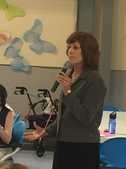|
Interesting that with this virus (COVID-19), many more now understand what a global community means. We are all connected, and we are all in this together. People are in lockdown throughout the world and more alone than ever; but paradoxically we are all grieving, worrying or suffering in some manner – together. According to a recent poll by the Kaiser Family Foundation, 50% of the respondents claim that they are experiencing a negative impact on their mental health due to the coronavirus pandemic. Dealing with the uncertainty of what lies ahead is a major hurdle for most people. There is a continuous flow of information about the medical aspects of this pandemic as it pertains to our physical health, but less is being done to address the psychological impact of a pandemic (https://www.nytimes.com/2020/04/09/opinion/sunday/coronavirus-depression-anxiety.html).
Author, Andrew Solomon, who is both a professor of psychology and knows about depression first-hand as a patient, describes four levels of responses that the social isolation and the uncertainty of this crisis have caused:
During this pandemic, we want to be mindful of our level of emotional responses and seek help accordingly. If you describe your level as #3 or #4, seek professional help. Consider yourself fortunate; there are many others in the “same boat” and in this environment there is less of a stigma attached to mental health conditions than during normal times. Certainly at level #2, you can seek counseling and there are many resources. You can ask your physician for a referral; word-of-mouth may work, or contact The Department of Behavioral and Community Health at 845.486.3400 or healthinfo@dutchessny.gov. For level # 1 and in conjunction with other professional measures for levels #2-4, consider self-help measures. Take advantage of the time and choose daily walks, bike rides, running, or hiking. Try taking ZOOM exercise classes; they are fun. Get creative with ZOOM: there are book clubs (I belong to the Red Hook Library’s Book Club), cocktail parties, and all types of meetings and social gatherings. Online concerts, theatre productions, art shows, dance ensembles, comedians, and virtual tours (e.g. The Orchid Show at NY Botanical Garden) provide endless choices. You can get those projects done that you have talked about, do more reading, watch those classic movies you’ve been meaning to get to, or enjoy your hobbies. Start up new activities: try knitting, learning a new language, cooking or baking, growing a vegetable or herb garden, woodworking, volunteer (safely) and donate to those who are really struggling during the pandemic. As we wrestle through this pandemic, we are also becoming very aware of time; it is passing differently than ever before. I was surprised with a discovery I made: We, as a society, are now identifying with the disabled. I honestly did not know what “crip time “ meant until I did research for this article. “Crip” is defined by Wikipedia as “an inclusive term, representing all disabilities.” In referring to “crip time” Margaret Price describes the term as “we (the disabled) live our lives with a flexible approach to normative time frames – like work schedules, deadlines, or even just waking and sleeping.” The study/essay by Ellen Samuels is entitled “Six Ways of Looking at Crip Time” and it gives us a window into the world of the disabled as it pertains to time for them (https://dsqsds.org/article/view/5824/4684). There are many angles to crip time, but one example that we can relate to as we experience what this virus has done to our lives is the uncertainty of our schedule. Maybe what we put on our calendar will happen or maybe it won’t. For us, the presence of COVID-19 has resulted in the uncertainty of many of our plans. This is a way of life for the disabled. Take for example a person with disabling cancer: What they put on the calendar is routinely uncertain. Plans and what happens could depend on what their next cancer scan reveals or what changes might happen with their mind or body (Our Pandemic Summer by Edwin Yong, Atlantic 4/14/20). Yong states: “We now have a better understanding of living in a world of shorter increments.” To end on a more hopeful note, there is a local program running at The Starr Library via ZOOM. It is called: “Getting Through This Virus Together” and is presented by Judith Garten, a lecturer, writer and leader of workshops (www.JudithGarten.com). If interested you can email Nan Jackson at njackson@starrlibrary.org for an invitation. It will be running on Wednesdays from 4:00 to 5:00pm for several weeks. We will get through this pandemic; it is just a question of “how.” Let’s hope this path will lead us to a more positive way to live – together! A big thank you goes out to all the mental health workers! Charlotte Michos is a clinical nurse specialist who values personal-centered care and serves as a Healthcare Consultant in helping others make informed decisions. For more information, email her or call (845) 548-5980.
0 Comments
Your comment will be posted after it is approved.
Leave a Reply. |
Please check back often.
© 2022 Charlotte Michos. LLC All rights reserved. Please contact Charlotte for permission to republish. Archives
March 2022
Categories |


 RSS Feed
RSS Feed